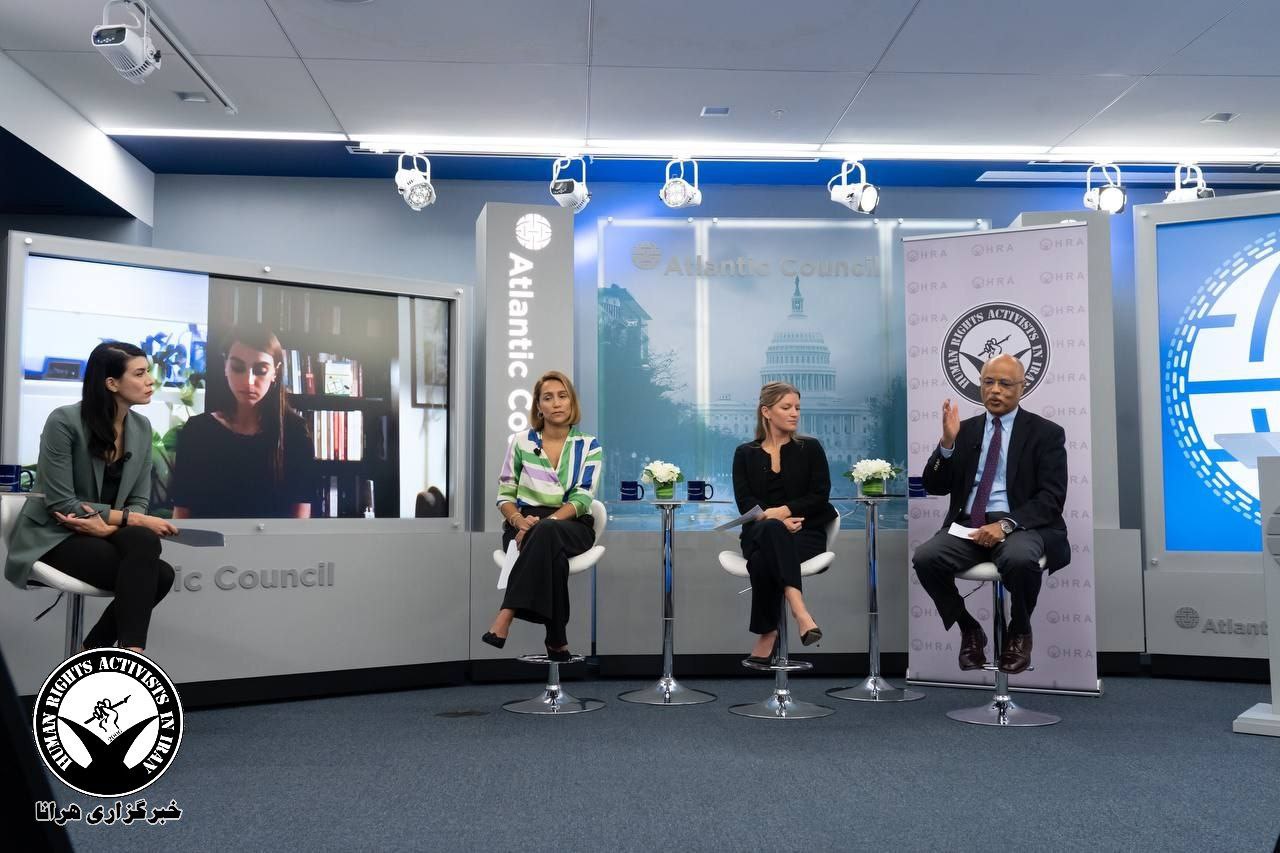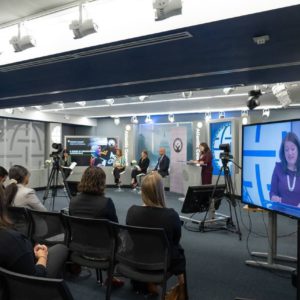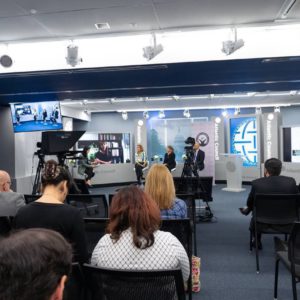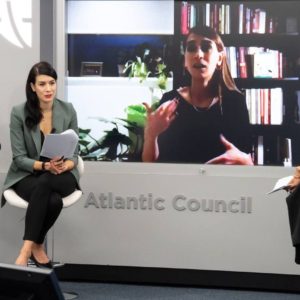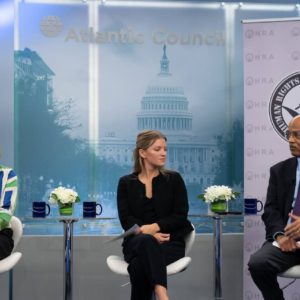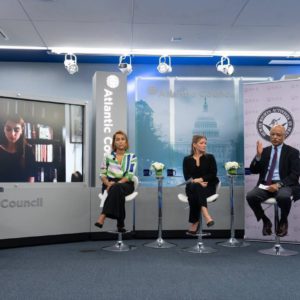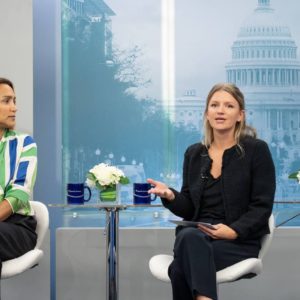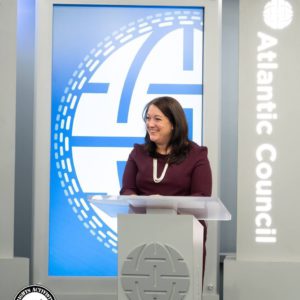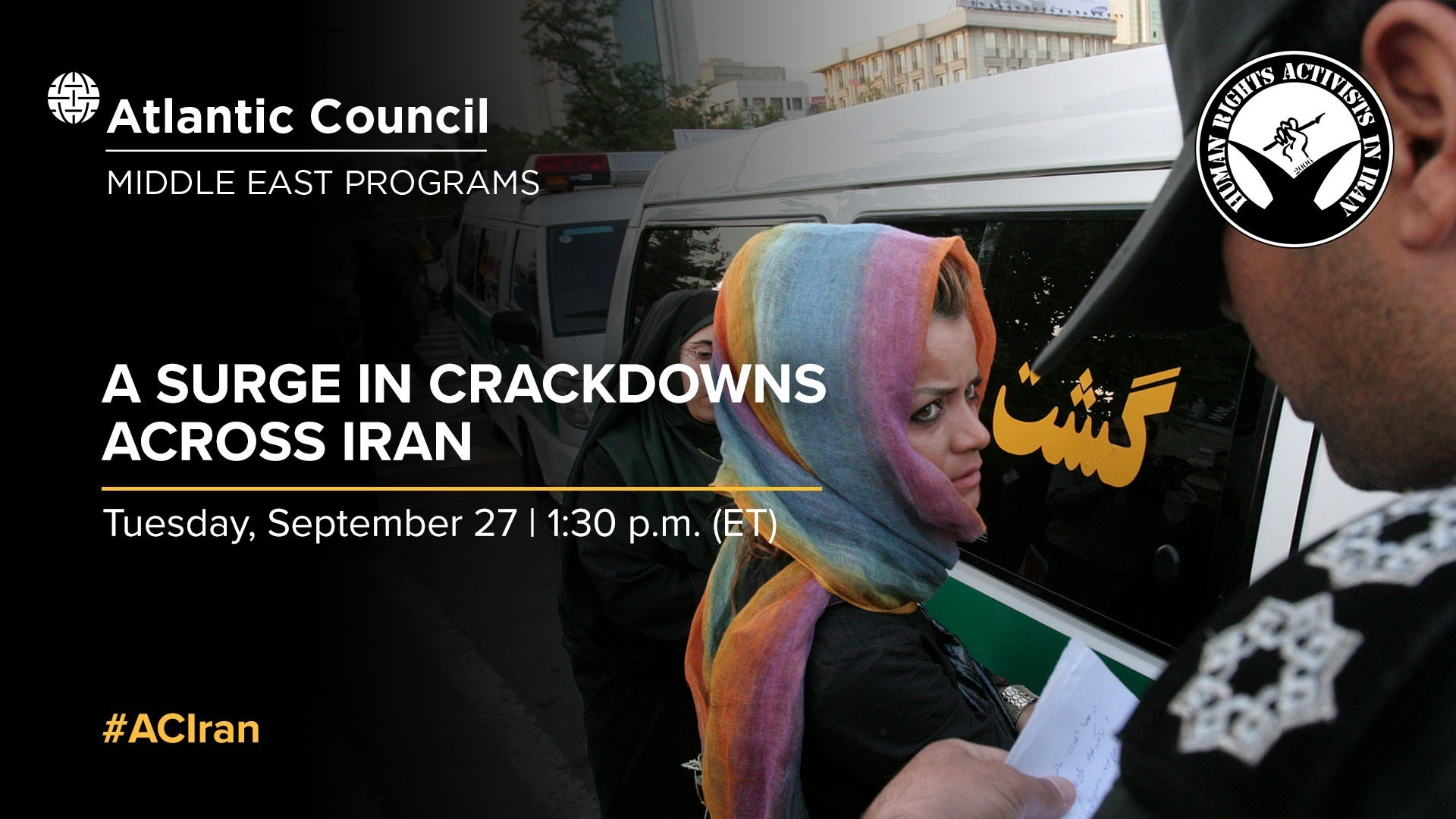“A surge in Crackdowns Across Iran” Panel Discussion was held yesterday, 27 September 2022 in person at Atlantic council building in Washington DC. The panel discussion that was hosted jointly by Human Rights Activists in Iran (HRA) and Atlantic council was also broadcasted online through various channels.
The discussion Moderated by Holly Darges from Atlantic council’s Iran Source included diverse speakers and panelists from US Department of States, Atlantic Council, Article 19, Committee to Protect Journalists (CPJ), Baha’is of the United States, and Human rights Activists in Iran (HRA).
William F. Wechsler the senior Director of Rafik Hariri Center & Middle East programs of Atlantic Council started the seminar by welcoming the guests. He also mentioned that the initial objective of the event at the early stages of planning has been “to call attention to dynamic that was happening inside Iran that was not getting as much attention and now, of course, the world is watching”, then he continues to remind us that Iran threatens neighbors in the region and in the rest of the world however “the first people that it threatens and the first victims are the people in Iran itself.” After setting the tone for the panel discussion ahead, Wechsler introduces the Keynote speaker Deputy Assistant Secretary for Iran and Iraq, Deputy Assistant Secretary for Press, and public diplomacy of US Department of State, Jennifer Gavito.
“The government of Iran has denied Iranians their human rights including through severe restrictions on the rights to peaceful assembly, freedom of association, freedom of religion or belief, freedom of expression. For decades political decent has been met with violent repression from the Iranian regime”, Das Gavito expressed concerns for the human right situation in Iran.
Das Gavito mentions the recent violent crackdown on peaceful protestors following the Mahsa Amini’s Death and the increased pressure on Iranian women by the Morality Police. Then she speaks of brave women who fight for their fundamental rights and continues to say, “The protests that we are seeing throughout Iran in spite of the government retaliation and attempts to obfuscate reality show very clearly that the Iranian people and the Islamic Republic of Iran do not see eye to eye”.
“The United States strongly supports the human rights of all Iranian women including the right to peacefully assemble and to express themselves without fear of violence” DAS Gavito then emphasizes that Iran’s human rights abuses is not limited to suppression women’s rights and peaceful assembly, rather Iran has a large number of political prisoners. She mentions the violation of rights of religious minorities by Iranian Government who have been targeted for their beliefs as well. DAS Gavito promised the people of Iran that the American government will hold the violators of human rights accountable. As an example, she pointed to the recent sanction of the moral security police and high-rank officials and said that the actions of the American government will not be limited to these cases and sanctions.
After DAS Gavito, Holly Darges, as the Moderator, gave a general explanation about the panel process and the general description of the events of the recent protests in Iran, and noted that the suppression of protests and the human rights situation in Iran is at a very critical stage. Darges then introduces all the panelists and starts the panel by Yeganeh Rezaian.
Yeganeh Rezaian, Journalist and Senior Researcher at the committee to protect Journalists (CPJ) spoke about her experience of encountering the Morality police as a woman who lived in Iran and her arrest and transfers to the same detention center where Mahsa Amini had been taken to. She continues by reminding that many women in Iran have a similar experience and are repeatedly detained for their choice of clothing. She also pointed to the courage of the new generation in Iran and said that the new generation is fundamentally different from its previous generations and does not bow down to the police and the ruling class.
Ms. Rezaian, who as a journalist has a history of being imprisoned in Iran, emphasized the importance of keeping track of arrests and the role of journalists, by saying Journalists working in international media have many restrictions on traveling to Iran, preparing documents and news reports, and that is why they usually only refer to the reports prepared by journalists inside Iran – despite the many restrictions. This is in a situation where the arrest of Iranian journalists and the pressure on them has increased dramatically in recent days, and this issue has made providing information more challenging than before.
Furthermore, she raised concern about increasing arrests of journalists even local journalists in very small towns, she claimed at least half of journalists arrested in recent days have been women and asked the international community to increase the pressure on Iran for the suppression and arrests of journalists in Iran.
Senior Advocacy Coordinator at Human Rights Activists in Iran (HRA), Skylar Thompson, started her remarks by reporting on the alarming situation of women and human rights in Iran. While presenting a heat map of current protests, Thompson highlights that just in the first 10 days of protests, “protests are spanning 93 cities at least there are in 30 of 31 provinces, they are in 18 universities” she then continues by saying that these protests are not just in urban streets of Tehran, but they are spawning geographically, class, gender, and age wise.
Skylar Thompson presented statistics on the repression of protesters in recent days in Iran, stating according to HRA’s documentation received to this point the youngest person killed was a 16-year-old boy, and she added, A 10-year-old girl was also targeted in these protests. she was shot by the security forces of the Islamic Republic of Iran, but fortunately she survived, although she is in critical condition.
According to Thompson, the senior advocacy coordinator at HRA the situation of human rights has exacerbated during Raisi’s term. She mentioned the upward trends in executions, the return of public executions after two years, and the execution of minor offenders. She also mentioned the surge in inhumane retaliation sentences such as amputation of hands and blinding of eyes.
Mrs. Thompson further pointed to the actions that the international community is obliged to take, such as sanctioning the officials behind suppression, as well as sanctioning institutions that violate women’s rights in Iran, and said: “The fact that the American and Canadian governments have imposed sanctions on the Morality Police and some officials is a positive step, but we do not know who the Canadian government has specifically sanctioned. On the other hand, the silence of countries like England is questionable, and we still do not know the result of the decision and possible actions of the European Union.
In addition, in answer to a question raised by the audience, Mrs. Thompson addressed the difficult livelihood situation of workers and teachers in Iran. She pointed out that teachers had organized many protest rallies in recent months, which led to the arrest of more than 150 teachers’ union activists.
Senior Researcher MENA region at Article 19, Mahsa Alimardani, raised concerns regarding free flow of information due to the internet disruption and blocking of many online services in Iran during recent protests.
Alimardani, as an expert in the field of technology and communication, discussed the challenges of communication in Iran in the last eleven days and that the Islamic Republic has used new methods to limit access to the Internet. She discussed the difference between the communication restrictions in recent events and what happened in November 2019 and explained that even though this time the internet was not cut off completely like in November 2019 and some Iranians have been able to use the internet in recent days. She added that the disruptions are more strategic than before and at hours that protests usually increase after 4pm, outages and other disruptions increase.
Alimardani Also spoke about Satellite Internet (Namely Starlink) and called the lifting of U.S. sanctions in this regard a positive step. She also warned of the vast disinformation in this regard and even malwares and unsafe apps that have claimed by their downloads users in Iran can connect to Starlink.
Despite the existing challenges, Alimardani expressed hope about the possibility of using satellite internet but also warned that the excessive attention to Starlink in recent days has been a bit misleading and has caused attention to be taken away from the actions that can be taken, such as providing safe and secure VPNs for users in Iran.
Anthony Vance, director of public affairs of the Baha’is of the United States, was another speaker at the meeting who addressed the problems of the Baha’is in Iran and said that the pressure on the Baha’is of Iran has increased systematically in the government of Ibrahim Raisi, especially since June. Depriving Baha’is of education, destroying their homes and spreading hatred against the Baha’i community are only a few examples of the oppression that Vance mentioned.
At the end of the joint meeting of the group of human rights activists in Iran and the Atlantic Council, the Panelists Answered questions submitted by the audience.

